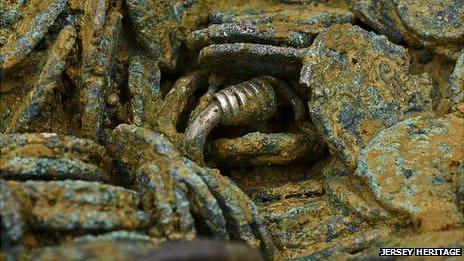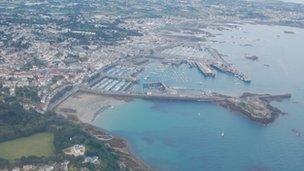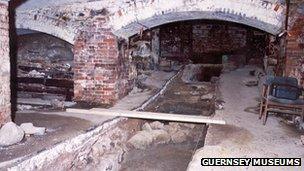Why did Celts bury treasure in Jersey but not Guernsey?
- Published

The prevalence of Roman-era Celtic coins in Jersey may be evidence of a lighter imperial presence in the island, compared to over-run Guernsey
The discovery of a hoard of approximately 70,000 Celtic coins in Jersey last year brought the total number found in the island to about 120,000.
In Guernsey, 27 miles (44km) to the north west, the equivalent total currently stands at five. So, why the disparity?
The answer, according to Guernsey's chief archaeologist, could lie in the shelter provided by St Peter Port's harbour.
Dr Phil De Jersey wrote his PhD thesis on Celtic coins of the Armorican tribes - those based between the Loire and the Seine. And, as someone who lectured on Celtic coins at Oxford University for 15 years, he was invited to work on the Jersey hoard.
He believes Guernsey's natural harbour encouraged regional commerce during the 1st Century BC, turning Guernsey into an imperial hub.
Jersey, meanwhile, remained a comparative backwater, where the paymasters of rebel armies could consider hiding their wealth from the Romans.
"It's always been the case that Guernsey is rather easier and safer to get to by boat," he said.
"One thing [Jersey] doesn't have is a very good natural harbour. St Peter Port has always provided shelter from the prevailing south westerly winds - that's something you just don't have in Jersey."
Barter economy
Evidence of Roman amphorae - a type of container - from the middle of the 1st Century BC has indicated a Roman presence in Guernsey prior to Rome's conquest of north west France.
Dr De Jersey believes this is consistent with a pragmatic, trading relationship between Guernsey's Celts and Roman merchants.

Even before its many phases of development, St Peter Port provided shelter from prevailing winds
"In the 50s BC, when Julius Caesar was rampaging through Gaul, it's possible that Guernsey had a more pro-Roman stance [than Jersey]," he says.
Dr De Jersey sees no reason for rivalry between the two islands to be viewed solely as a modern phenomenon and says cultural and political differences between the two populations could well have encouraged a divergence of relationships with the Romans.
It may seem counter intuitive to associate increased trade with a scarcity of coinage but Dr De Jersey says one follows naturally from the other.
"You've got to remember that coins at this time are not used in the same way as coins now," he says.
"A lot of trade was done by barter. Coins at that time, particularly the ones that are found in such huge numbers as in Jersey, had a very specific use - and that seems to have been paying soldiers and mercenaries who were fighting Julius Caesar."
The recently excavated Jersey hoard was found on the east side of the island - nearest to Normandy - and consisted entirely of Celtic coins and treasure, unadulterated by any Roman items.
Dr De Jersey said it was almost certainly buried there by the Coriosolite - one of a number of Armorican tribes which battled Caesar's armies.
All the coins dated from a narrow period, supporting the theory they were minted for the payment of soldiers who were needed to face down a sudden threat from Rome.
The coins' positions, relative to each other, suggest the hoard was tipped into a pit by the barrow load.
So, it looks like we have a war chest of soldiers' pay being slung into a hole in the ground on an overlooked island within sight of a trading port friendly to Rome.
'Fundamentally altered view'
But could there be a simpler explanation for the numerical disparity? Have Guernsey's coin hoards just not been found yet?
Not according to Dr De Jersey.
"I think we can exclude that as the reason because both islands have been very heavily cultivated - and built on, as well - so I think it's a genuine difference," he says.
In addition, archaeology in Guernsey has unearthed, since the 1980s, a wealth of evidence of Roman occupation which is lacking in Jersey.

A dig at Guernsey's Bonded Stores changed perceptions of Roman influence in the island
"A generation ago, it was generally believed that the Roman Empire had mostly passed by Guernsey. There were a few finds of coins, and scraps of pottery, but nothing very substantial," says Dr De Jersey.
"Altogether we now have records of about 90 finds of Roman material from 50 different locations.
"In the space of a generation, our view of the Romans in Guernsey has been fundamentally altered and we can see now that they had a significant and long-lasting presence on the island."
"It could just be that Jersey are a little bit behind in finding evidence but they still only have a very few sites with Roman material."
Secret locations
What remains elusive in Guernsey is a villa or burial ground.
However, Dr De Jersey has strong suspicions about two Guernsey sites which could yet yield one or both of those.
Field walking was undertaken in one of them a few years ago and several artefacts were discovered.
Their locations will remain a secret, however, as without the budget to excavate, record and preserve a large site, Guernsey's archaeologists would prefer them to remain undisturbed by enthusiastic amateurs.
Much work remains to be done but for the present, it seems Jersey must plough on without its Roman heritage and Guernsey without its Celtic currency.
Some hopeful Guerns may hold out hope of a hoard turning up and increasing the smaller island's coin count.
However, Dr De Jersey suggests it is actually more likely to reduce.
"We seem to have five Celtic coins but two of those I'm a bit doubtful about," he says.
"I wonder whether someone actually bought them off the internet."
- Published2 January 2013
- Published13 September 2012
- Published13 September 2012
- Published26 June 2012
- Published25 May 2012
- Published25 November 2011
- Published16 January 2011